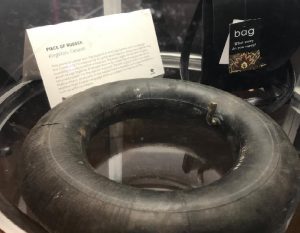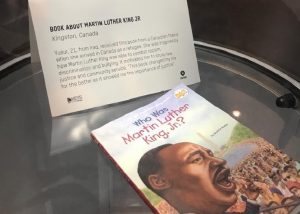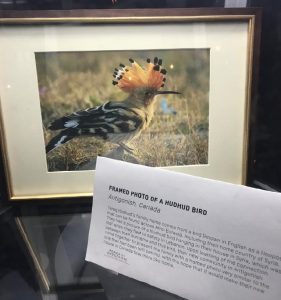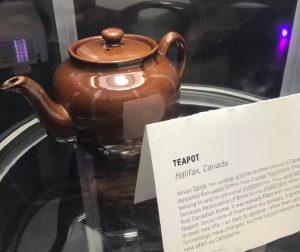How everyday items celebrate solidarity and our shared humanity
Just a few weeks ago, I travelled to five Canadian cities to help present Oxfam’s award-winning exhibit Museum Without a Home, a tribute to the strength of refugees and the kindness of the people who welcome them to their new countries. The items exhibited are real every-day objects gifted to refugees when they arrived to Canada that symbolize their journey, new friendships made and the support they received. I was touched to learn so many of the stories were from women and girls, who face unique challenges when displaced by conflict.
In each city we visited, Kingston, Toronto, Halifax, Winnipeg and Victoria, we partnered with remarkable local organizations, committed to supporting newcomers to plan five memorable events. They connected us with people who arrived to Canada as refugees and were willing to contribute an object and, with that, a piece of their story. Partnerships and storytelling drove each event weaving unique experiences of refugees into a cross-country narrative of unity. Poets and musicians who were once refugees shared the stage to inspire us all with their art and experiences. These stories and expressions will continue to inspire through the incredible connections made.
While touring with the Museum Without a Home exhibit, I had the pleasure of meeting hundreds of Oxfam supporters in each city. It’s not very often that I have this kind of opportunity – to have meaningful conversations with people who share values, who advocate for what’s right, and who invest in Oxfam so our work is possible.
It’s for the people I met on the tour, those who experienced the exhibit and those who were not able – supporters, new Canadians, partners – I’m sharing the joy that this exhibit is all about. Gratitude, solidarity and our common humanity. Here are just a few of the inspiring stories:
A PIECE OF RUBBER

This may look like a simple piece of rubber, but it represents so much more for the woman who donated it to our exhibit in Kingston. Today, she and seven other refugee women now make and sell beautiful bags as part of the Begin Again Group (BAG). The bags are made out of the recycled rubber inner tubes, just like the one we had on display. The project has given the women members confidence, economic independence and a sense of community through this special micro social enterprise in Kingston.
YUSUR'S BOOK

Yusur, 21, from Iraq, received a book about Martin Luther King Jr. from a Canadian friend when she arrived in Canada as a refugee. She was inspired by how Martin Luther King Jr. was able to combat racism, discrimination and bullying. It motivated her to study law, justice and community service. “This book changed my life for the better as it showed me the importance of justice”.
A SPECIAL DICTIONARY
In Toronto, I heard the story of Hunaina, who arrived in Canada from Somalia as a refugee and could barely speak English. She did not like the feeling of constant confusion and having interpreters speak on her behalf. Hunaina received a dictionary from the FCJ Refugee Centre, and made a vow to learn one new piece of vocabulary every day: “The difference between then - when I could barely speak a word - and now, is because the FCJ Refugee Centre believed in me and supported me.”
THE HUDHUD BIRD

Tareq Hadhad’s family name comes from a bird (known in English as a Hoopoe) that can be found across Afro-Eurasia, including their home country of Syria. They had a picture of a Hudhud bird hanging in their house in Syria, which was lost when they fled to safety in Lebanon. Upon learning of the connection between their surname and this bird, their new community in Antigonish came together to present the family with a framed photo very similar to the one that had been left behind, with the hope that it would make their new house in Canada feel more like home.
TEA FOR TWO

When Tanja, her mother and her brother arrived in Canada as Government Assisted Refugees (GARs) from Former Yugoslavia, they had no country to belong to and no personal possessions. The family was helped by the Immigrant Services Association of Nova Scotia (ISANS), and when they walked into their first Canadian home, it was already filled with new belongings – including a teapot. Since none of them were tea drinkers, it quickly became a decoration in their new life – an item to observe, rather than use. Over the years, their furnishings have changed, but the tea pot remains as the symbol of their new start as Canadians.
~~~~~
The Museum Without a Home tour was an experience beyond the beautiful items and stories behind them. In each city, I worked with fantastic partners and inspiring individuals who helped us create memorable events and embrace solidarity. As many nations close their doors and their hearts to displaced people, it was heartwarming to be part of and recognize the communities who provide safe havens to refugees and celebrating our common humanity - this is more important than ever.
Special thanks to partners who made this Museum Without a Home event possible:
• In Kingston: the exhibit was held at The Isabel Bader Centre for the Performing Arts. We partnered with KEYS Job Centre, an organization that provides employment support and resettlement services to newcomers (among other initiatives). Seconde Nyanzobe, Refugee Resettlement Assistant Advisor at KEYS Job Centre, addressed the crowd. Members of the Begin Again Group (BAG), shared the rubber item. Entertainment was provided by local Poet Rufaida Alakhabaz, a Syrian writer who was sponsored with her family by the Kingston Writers Refugee Committee in Dec 2016, and Fahd Abou Zeinadin, a Syrian musician who arrived to Canada as a refugee, played the oud and sang a few songs accompanied by his children. We were able to offer attendees Baklava from Al-Amal Baklava.
• In Toronto: the exhibit was held at the Centre for Social Innovation (CSI). We partnered with the Ontario Council of Agencies Serving Immigrant Women (OCASI) and FCJ Refugee Centre. Both Executive Directors are well-known women’s rights advocates and spoke powerfully about the changes needed to make Canada a more inclusive place. Bänoo Zan, an Iranian-Canadian poet whose poems powerfully convey the immigrant experience, performed several poems for the audience. Beroea Kitchen, a business started by a wonderful couple from Syria who came to Canada as refugees, catered the event and offered a delicious variety of Middle Eastern food.
• In Halifax: Museum Without a Home was presented at the Halifax Distilling Company. We partnered with the Immigrant Services Association of Nova Scotia (ISANS) and Peace by Chocolate – a chocolate company started by a Syrian family who arrived to Canada as refugees. Their story, and their chocolate, is amazing!
• In Winnipeg: the exhibit was held at the Canadian Museum for Human Rights. We partnered with the Immigrant and Refugee Community Organization of Manitoba (IRCOM) and World University Services Canada’s Student Refugee Program at the University of Manitoba.
• In Victoria: the exhibit was held at the Victoria Event Centre. We partnered with MOSAIC, one of the largest settlement organizations in Canada. The crowd was welcomed by Victoria City Counsellor Sharmarke Dubow, a Somalian man who came to Canada as a refugee. Interestingly, he voted for the first time ever at the same time as he was elected City Counsellor. Live performance by Sari Alesh, a Syrian violinist who used to play for the Syrian National Symphony orchestra before becoming refugee. A poetry reading by Aziza Moqia Sealey Qaylow, Victoria’s 2019 Youth Poet Laureate, who shared her emotional poem about her Somali-Canadian roots and her father’s experience as a Somali refugee. Catering was provided by Kebab Me Krazy, a catering business started by two individuals who arrived to Canada as refugees from Syria and Yemen.

